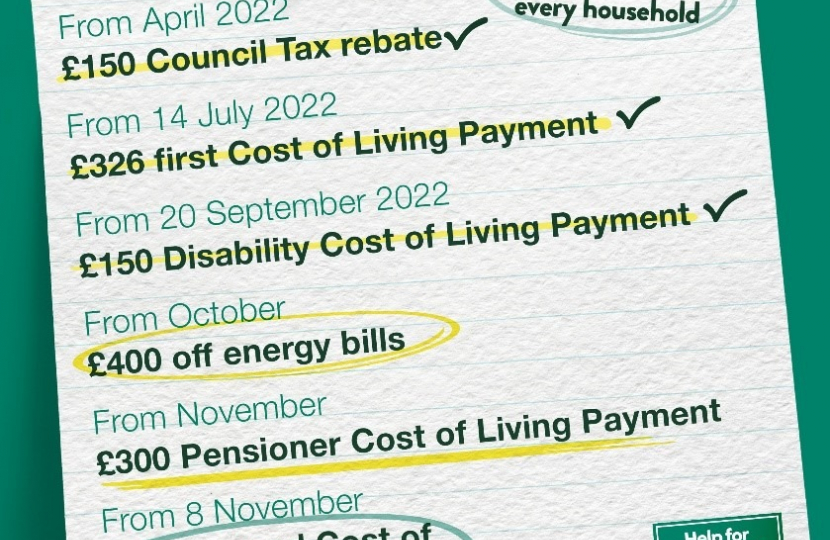
As we enter the winter months the cost of energy remains the main challenge the government is seeking to address. The Russian invasion of Ukraine caused a huge spike in gas prices taking them to record highs with a knock-on impact on household and business energy bills and this came after we were already seeing some supply chain disruption in the immediate aftermath of the pandemic.
From this week, over 13,000 vulnerable families in the Camborne and Redruth area will automatically receive a £324 means-tested Cost of Living Payment with no need to apply. This direct support is part of the Government’s £37 billion package of cost-of-living support, including up to £1,200 worth of direct help for vulnerable households.
In addition to the means-tested cost of living support, the Energy Price Guarantee will help to keep household energy bills as low as possible saving the typical household £700 this winter. The £400 Energy Bills Support Scheme will also help every household with the cost of energy this winter.
One of the lessons from this current situation is that we must ensure that we increase our energy independence in a sustainable way. In the short term, this means upgrading domestic boilers and improving the energy efficiency of homes. The Government is already taking steps towards this by removing the 5% VAT on energy-saving materials and launching the Boiler Upgrade Scheme to offer grants on low carbon heating technologies. I recently visited Kensa Utilities' innovative ground-sourced heat pump demonstration in Stithians. The demonstration is a blueprint for how ground-sourced heat technology can be rolled out UK-wide and a great example of how we can harness our readily available natural resources to reach net zero by 2050 and ensure we reduce our reliance on natural gas imports.
Many rural parts of Cornwall also rely on oil boilers or Agas using kerosine. In a few weeks’ time, I will be visiting another ground-breaking pilot being run at Kehelland where kerosine oil is being replaced by Hydrogenated Vegetable Oil (HVO). It simply needs a minor adaptation to the boiler and HVO, which is derived from plant waste, has a far smaller carbon footprint. I think that innovative solutions like this are a vital stepping stone as we diversify away from a reliance on conventional oil and gas.
COP-27 is currently taking place in Egypt where we are again being reminded that Climate Change is a global problem needing a global solution. I am proud of the progress that the UK achieved while we held the Presidency of COP. As Environment Secretary at the time, I was involved in parts of the agreement including the commitment made by over 100 world leaders, representing countries containing more than 85% of the world’s forests, to halt deforestation and land degradation by 2030.
When we began our COP Presidency, just one-third of the global economy was signed up to net zero, today it’s 90 percent. It is vital that globally we build up this work and continue to work to tackle the threat posed by climate change and at the same time ensure that energy bills return to much more affordable levels over the next few months and years.

